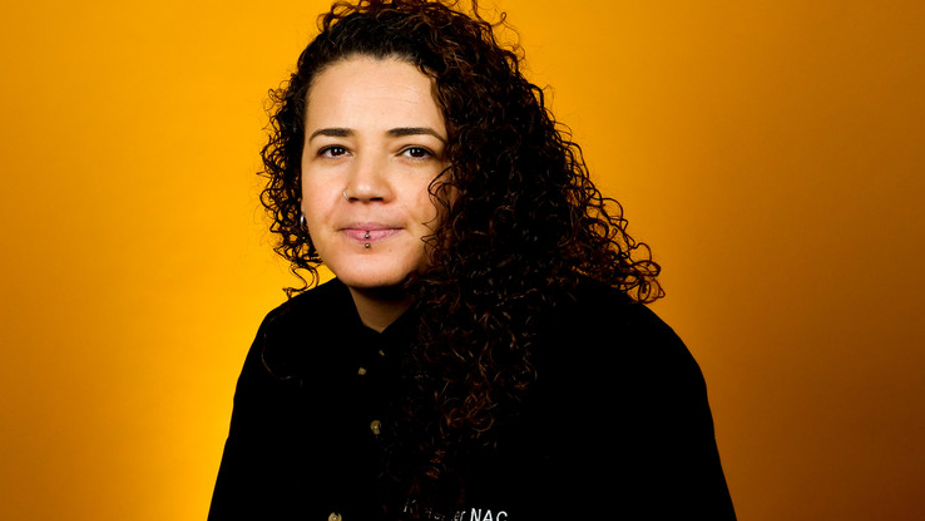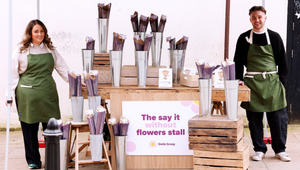
Uprising: Fighting for Equality is Naveen Sonne’s “Ultimate Purpose”

Challenging inequalities is a thread that runs through Naveen Sonne’s story. As a child, she remembers being told “girls aren’t allowed to play” but would turn up to matches in her football kit just in case the older boys changed their minds. Luckily, they did sometimes.
In fact, football was a large part of her life growing up. She even played for Manchester City Girls under 10s, under 12s and under 14s, as well as taking part in “every sport at school”. She admits to being sports obsessed, once even begging her mum to allow her to sleep in her new football boots. “She allowed me, but I woke up without them on, of course!”
“I would go home covered in mud, cuts, and bruises every day,” she adds. “I was what they called a ‘tomboy’ in the ‘80s and ’90s.”
Outdated gender roles weren’t the only thing Naveen had to contend with, she has also faced racism throughout her life. “Growing up in Manchester being of Ghanaian and Irish heritage, I often experienced racism from other children. Although mixed-race, my mum has always been considered Black in a predominately white city, which was felt in her experience with far-right supporters when she was a child. I’ve also experienced racism first-hand. In the late ‘90s and early ‘00s, it became a street trend to call a mixed-race person a ‘breed’ as if ‘half-caste’ or ’quarter-caste’ wasn’t bad enough.”
Naveen’s racial identity developed into one of the most important parts of how she defines herself. “I’m proud of my heritage. Being a gay woman is a big part of my identity, but I tend to identify with my race first. I can’t tolerate racism or any form of discrimination and I think that is partly to do with my cultural background but also due to growing up in a diverse area.”
Her upbringing on “a deprived estate” in Manchester is where she derives much of her motivation from. As a teenager she felt constrained by stereotypes. “I felt there was an expectation for young mixed-race girls from inner city Manchester to act a certain way. As a result, I would get in trouble a lot when I was younger and it’s those experiences that make me determined to change media representations, so that younger people don’t just see one distorted view of themselves. I also think poverty is a major driver for me. I was raised by my single mother, so I know what it feels like to struggle, but in a way that experience has motivated me more than anything in the world, as it’s made me never want to struggle as an adult.”
While Naveen’s environment was undoubtedly challenging, she also sees the wonder in growing up surrounded by multiculturalism. Her primary school was one of the most diverse schools in Manchester, which meant she had friends of all ethnicities and religions. “I was always curious to know more about their culture. Obviously, we learned about other people’s cultures in school, but I always asked my friends more personal questions. I guess even at an early age I wanted an authentic insight into their experiences.” This curiosity has paid off, helping her to develop understanding and empathy for others - a skill which no doubt contributes to Naveen’s talent as a planner.
Her curiosity extended into music too, where her range was characteristically eclectic. She was a member of a number of music clubs at school, playing African drums, steel pans, drumming, percussion and cello.
For the past 10 years Naveen’s musical passions have mostly been focused into her life as a DJ in bars and clubs in Manchester. “There’s nothing better than seeing a club full of people coming together under one roof for the love of music, but unfortunately that seems like a distant memory now. I just hope once we’re on the other side of the pandemic, we will once again have a vibrant night-time industry.”
She supposes she’d be described as an “open format DJ”, but her specialism these days is techno. Social media and digital music platforms have enabled her to pour her curiosity into deep research on that front, discovering underground techno producers to include in her sets. “I’ve found some real underground gems on YouTube that literally had no more than 100 views,” she says. “The more obscure the better for me.”
When she’s trying to chill out, Naveen can’t go wrong with a bit of “old skool RnB and soul” - she loves Erykah Badu, Jill Scott and Lauryn Hill.
“I’ve always had an entrepreneurial spirit,” she says. Even as a child, she was constantly thinking of ways to make money. As a result she’s worked since she was 12, when she got a cleaning job at an office near her school, one day a week. “I can still remember how proud I felt opening my first payslip. I think that shaped my work ethic from an early age, but also made me very independent at the same time.”
Naveen knows how to put in a shift and she did a lot of it before going anywhere near her current career as a planning executive. By 15 she was working as a trainee youth worker and play worker. From then until her early 20s she worked for Manchester City Council and a few other community organisations as a youth worker and sports coach. Due to dropping out of college at 18 and not getting enough hours as a youth worker/sports coach, she then went into warehouse work and other manual jobs.
Having established herself as a DJ, in her late 20s Naveen started running club nights, feeling event management was a natural progression. That’s where marketing and branding began to interest her. “I realised that I also liked the conceptual side of the events and how that came to life in the branding and advertising.” Wanting to learn more, she enrolled on a business studies access course at college that had a marketing unit. Then she did a BA hons degree in Advertising and Brand Management and an MSc in Creative Advertising, which she completed late in 2019.
Studying at university as a mature student was challenging, she says. She’s a carer for her mother and was working part time at Manchester Airport as a trolley operative during her studies. It was shift work at the airport, so sometimes she worked through the night or did early mornings and then had to go to university straight after a shift - still in her uniform. “I often felt isolated from my classmates, as many of them were much younger, so were able to experience the social side of university – having fewer responsibilities.” She enjoyed her Masters degree more, as a lot of the students were similar to her age or slightly younger, so she could relate to them more. “Having that social element really helped me overcome the intensity of the workload,” she says, “and being able to share the experience and encourage each other kept me going. Our class WhatsApp group was a lifeline.”
Naveen was able to channel her experiences growing up into academic research, focusing her Masters thesis on intersectional stereotypes and colourism in fashion magazines. She expands: “People don’t actually realise how much the media shapes our beliefs about society. The consistent emphasis on white beauty has very damaging consequences for women of colour, and I feel it’s not only my duty to raise awareness on this issue, but to also guide brands on best practice.”
She is now putting her research into action at McCann Manchester as a planning executive. She joined the agency in 2020 on the day before the first UK lockdown, so has been working from home in Ardwick, Manchester. “It’s been a challenge getting to grips with the new role and the new home office environment at the same time. However, I believe I’ve been resilient and have made an impact since being with the agency.”
Her strategic specialism is something her role has allowed her to really lean into. She describes her expertise as: “race representations, particularly intersectional stereotypes, and colourism. I’m dedicated to championing fair and authentic representations of women of colour.
“I think what gets me really riled up is that it almost seems like those in the advertising industry - and the media more broadly - have the collective attitude that they are somehow being reactive to a social problem and don’t recognise or acknowledge that in modern society they are actually, for the most part, the cause of that social problem. There is an extensive body of research detailing the social impact that the media has on its viewers, in particular the physiological and psychological implications it has for people of colour. It’s a common position within sociology that the media play a central role in shaping social beliefs, but there remain many people in the advertising industry who are completely oblivious to the social consequences of their own practice and that’s really worrying.”
Ultimately, Naveen wants to contribute to making advertising more diverse and inclusive. She’s currently working on a research project and strongly believes in her strategic approach. “I only hope it makes a meaningful difference,” she says.
“We are trying to improve ourselves as an industry in terms of diverse representations, but I think there remains a lack of conceptual diversity, whereby we often still approach work through a very Eurocentric lens, and we need to start fostering an environment where diverse thinking is accepted and celebrated.”
Aside from her academic insight into race representations, Naveen sits on the agency’s Diversity, Equity & Inclusion Council, created by the 350 strong agency at the beginning of 2020. She also represents the Manchester office on McCann Worldgroup’s Global Diversity Coalition.
Her involvement has seen her play a decisive role in McCann Worldgroup's internal D&I initiatives such as Black History Month and as a featured speaker spotlighting the intersection of race and mental health in the UK against the backdrop of the Covid-19 pandemic.
Even though she’s only a year into her advertising agency career, Naveen has plenty of life experience, relevant expertise and knowledge of the industry today to bring to bear. She takes pride in using her diverse network to help her “stay fresh with the D&I conversation on social”. She tries to stay as active as possible on LinkedIn to “keep an ear to the ground with what’s going on in adland” and she enjoys running a weekly agency newsletter, that keeps her on the lookout for interesting stories. That also keeps her in tune with what’s going on in the industry and the world.
“There are a lot of people within McCann Worldgroup that I admire,” she says. The new virtual way of working has actually allowed Naveen to connect with people around the world that may not have connected if all work took place in the office, she notes, “and I’ve been lucky enough to build special relationships with colleagues I’ve never even met in person but who continue to inspire and support me every day. So, they are my true idols.”
They may not have met her in person, but all of her McCann Worldgroup colleagues will have an idea of who Naveen really is. An important lesson she’s learnt is: “Always be your true self! I think it’s exhausting trying to balance the work and personal versions of yourself. I always bring my true personality into any project I’m involved in and thankfully I’m encouraged to do so at McCann.”
On her future, Naveen says: “I’m only just getting started, I have more D,E&I initiatives in the pipeline and more research planned. I feel like all my personal experiences have led me to this moment and, as painful as some of those experiences have been, they have given me the ultimate purpose in life, and I’m grateful to be part of a network and organisation that is embracing diversity and inclusion and most importantly really understands why it is doing so.”













